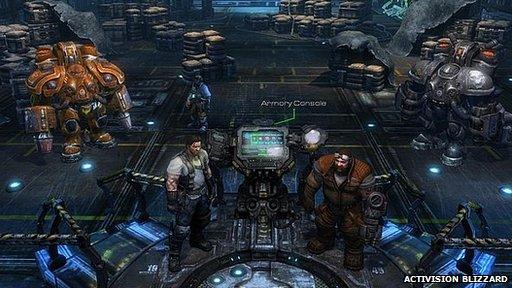Blizzard sues Starcraft II cheat hackers
- Published

Activision Blizzard wants to stop the hackers giving players an "unfair advantage"
Activision Blizzard is trying to sue hackers who have created cheats for its Starcraft II video game.
The publisher says the software undermines online multiplayer battles and could cause players to lose interest in the title.
It has filed calling for the unidentified programmers to be made to compensate it for copyright infringement.
One industry watcher described the move as "aggressive".
"The only reason that cheats like this exist is because there is demand for them," said Ed Barton, a video games analyst at the consultancy Ovum.
"But the competitive scene for Starcraft is very important, especially in Korea, and Blizzard needs to preserve the fantasy of the core experience."
News of the legal action was first reported by the , which noted that the ValiantChaos MapHack cheats at the centre of the case remained available online if gamers paid a "donation" of $62.50 (拢37).
The creators have promoted the hack on Blizzard's own forums as well as other sites.
Professional players
The science fiction real-time strategy game Starcraft II was released on 27 July 2010, and has subsequently been followed up with expansion packs,
Starcraft II tournaments s are popular in South Korea, where the top player's winnings total $423,988
Blizzard's noted that the Heart of the Swarm add-on was 2013's best-selling PC game at US stores, and the company is still working on a final extension called Legacy of the Void.
Its court filing talks of wanting "to protect the sanctity of the Starcraft II gaming experience" and notes that its terms and conditions explicitly prohibit the use of "hacks, mods or any other unauthorised third-party software" designed to allow a player to boost their ranking and access new weapons and abilities.
"The competitive aspect of Starcraft II's multiplayer environment is one of the driving forces behind sales of the game," it states.
"In fact, the Starcraft game are played as a competitive sport around the world, with professional or semi-professional players competing for national and international titles.
"Additionally, the ability to play the game against skilled human opponents keeps the player experience fresh and interesting, thus ensuring that players return to the game frequently."
The firm adds that it wishes the court to shut down the hacks and make their creators hand over the profits they had made.
Legal precedents
The case has echoes of Nintendo's court battles against the Games Genie - a cartridge that allowed players to enter codes to cheat at Super Nintendo Entertainment System (SNES) titles in the early 1990s.
Blizzard previously won a case against coders who sold software used to cheat at World of Warcraft
Nintendo also alleged copyright infringement but lost the case after the judge ruled that consumers had the right to "experiment with the product" after paying a fair price for a game. Nintendo's rival Sega later gave its backing to the product and helped fund its marketing campaign.
However, Blizzard has been more successful in this area following 1998's introduction of the Digital Millennium Copyright Act, which criminalised software designed to bypass digital locks.
In 2010 the firm won a copyright infringement , which had sold a software "bot" that automatically played the early levels of World of Warcraft for players.
"The law in this area is relatively new as these forms of online games are only a decade old," Jas Purewal, editor of the Gamer Law news site told the 成人快手.
"Nonetheless, there have been a number of victories in this area and overall the odds are stacked against hackers and against cheaters once a games company is determined to take legal action."
- Published11 November 2013
- Published12 November 2012
- Published27 July 2010